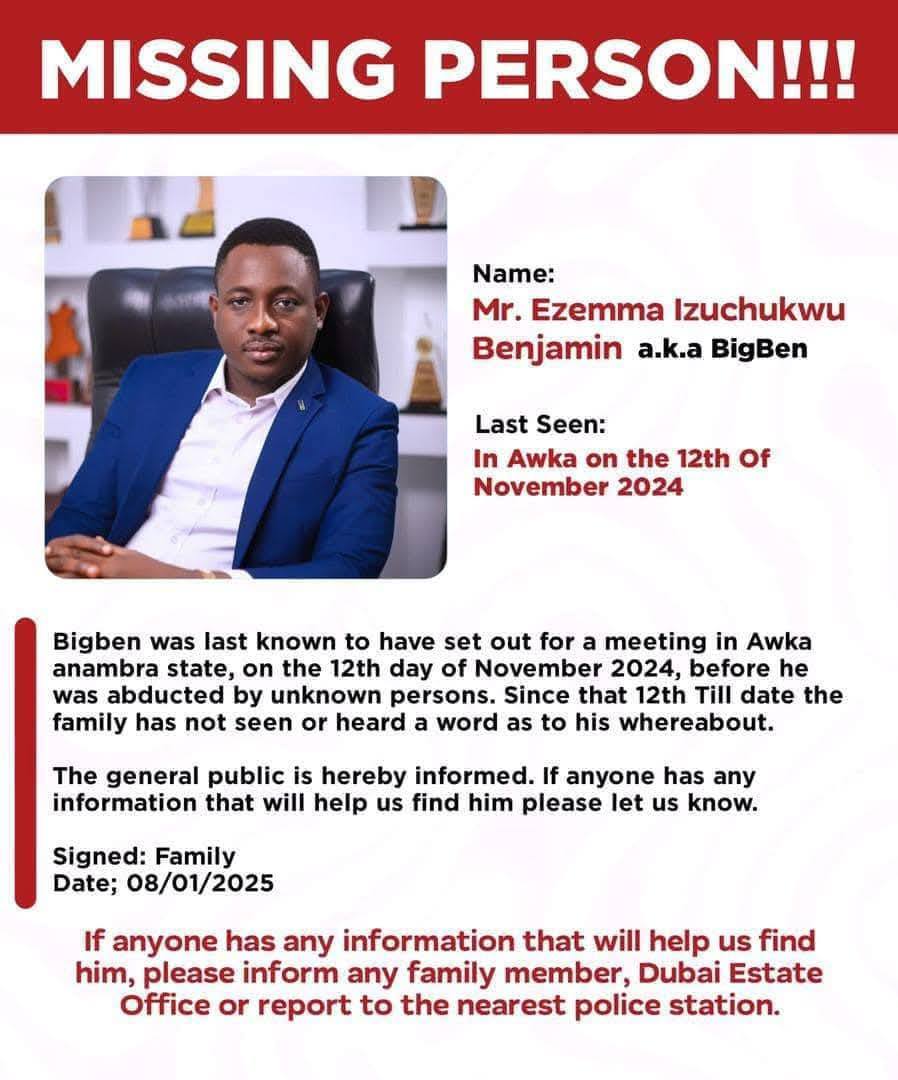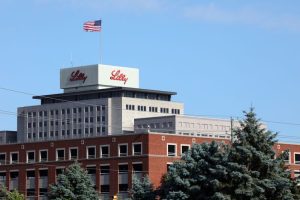The Vanishing of Big Ben: Inside the Alleged Kidnap of a Real Estate Mogul in Anambra
The story of Benjamin Ezemma, better known as Big Ben, is one that has captivated residents of Anambra State and beyond. A prominent figure in Awka’s real estate industry and the co-founder of the upscale Dubai Estate, Big Ben was once a name that symbolized ambition, prosperity, and the new wave of indigenous property development transforming the capital city of Anambra. But in November 2024, all of that changed.
Big Ben vanished under mysterious and alarming circumstances, prompting an investigation that has since exposed allegations of betrayal, greed, and a bitter land dispute that may have led to a sinister conclusion. His disappearance sparked a wave of concern across the business and real estate communities, and has led to an ongoing criminal trial that is being closely watched by legal analysts, community leaders, and concerned citizens alike.
Big Ben was last seen on a quiet afternoon in November 2024. According to close friends and family, he had left for a scheduled meeting in the Agu Awka area. That meeting, they would later learn, was framed as a reconciliation session over a brewing land ownership dispute. The parties involved, believed to be members of the local community and some of his former business allies, had apparently extended an olive branch to resolve their differences amicably. But Big Ben never returned from that meeting. His phones went dead. His social media accounts fell silent. Days turned into weeks, and eventually, the search for him became a rallying cry.
YOU MAY READ
Where is my husband?! DSS has concluded investigations and they know the people my husband went to meet with but till date no action has been taken about the outcome of the DSS investigations.
The case took a serious turn when the Department of State Services (DSS), after mounting pressure from Big Ben’s associates and family members, initiated a full-scale investigation. What they uncovered was deeply troubling. According to court proceedings currently underway, three primary suspects emerged from the investigation: Ozo Jeff Nweke, Tochukwu Nwokoye, and David Chukwunonso. Each of them had reportedly been involved in business dealings with Big Ben, particularly around the controversial plots of land upon which Dubai Estate and adjacent developments were being constructed.
Call logs, cell tower triangulation data, and testimonies from key witnesses painted a complex picture of collusion and premeditation. According to DSS forensic analysts, Big Ben’s phone activity on the day of his disappearance ceased around the area where he was last believed to have been—Agu Awka. The final calls made from his phone were traced to known contacts, including one of the suspects. Surveillance footage from nearby buildings and roadside kiosks, while inconclusive in capturing the act itself, confirmed that he had entered the vicinity of the location where the alleged reconciliation meeting was held.
Sources familiar with the case describe a rapidly escalating land ownership conflict between Big Ben and some powerful stakeholders in Awka. While Dubai Estate was widely seen as a landmark development that signaled the city’s entry into elite property circles, it also attracted envy and resistance. Rumors began to swirl in mid-2024 that some of the land upon which the estate was being constructed had overlapping claims, particularly from local families who believed they had not been properly compensated.
Big Ben, known for his assertive business style and strong political connections, reportedly tried to resolve the matter by involving the community heads, but his efforts yielded little success. What started as a civil disagreement gradually transformed into legal threats, community petitions, and finally, a so-called peace meeting that, prosecutors argue, was a trap.
YOU MAY READ
Woman Reportedly goes Missing After Joining Prayer Group Suspected to Be a Cult
The lead prosecutor in the case stated during the opening day of trial that “the evidence before this court strongly suggests that the accused persons orchestrated a deceptive meeting, under the pretense of dialogue, with the intent to do harm or to facilitate the abduction of Mr. Ezemma.”
The accused—Ozo Jeff Nweke, Tochukwu Nwokoye, and David Chukwunonso—have all pleaded not guilty to the charges. Their defense attorneys argue that while their clients did indeed have ongoing disputes with the missing man, none of them were involved in any plan to abduct or harm him. “Our clients are being scapegoated because of their past affiliations with the victim,” the lead defense lawyer said in court. “This is a tragic situation, but it is a leap to say they are responsible without hard proof.”
However, the court has so far heard compelling testimony from digital forensic experts who presented call logs showing frequent communication between the three suspects in the days leading up to the alleged meeting. Moreover, security agents told the court that phone tracking analysis showed that one of the suspects had switched off his device minutes after Big Ben’s last known phone signal.
Beyond the digital evidence, the court has also received witness testimonies that indicate that there was bad blood between Big Ben and the accused. One witness, a former employee of the Dubai Estate firm, testified that she overheard a heated argument at the estate site involving Big Ben and one of the accused. According to her, threats were exchanged.
Meanwhile, community elders in Awka are increasingly divided over the matter. Some traditional titleholders have appealed for calm, urging the public to let the courts decide. Others, however, have openly accused the accused men of foul play. A prominent community chief, who asked not to be named, said during an interview, “There’s no doubt in our minds that this was planned. That young man [Big Ben] was shaking things up too much. Too much power, too fast, and he stepped on the wrong toes.”
YOU MAY READ
5 de@d and 20 missing as boat conveying burial guests capsizes in Delta
For the family of Big Ben, the past six months have been a painful and surreal experience. His younger brother, Emeka Ezemma, told reporters, “We still pray every day that he’s alive somewhere, maybe being held. But as each day passes, our hope gets dimmer. What we want now is justice.”
Adding another layer to the case is the political and economic weight Big Ben carried in Anambra. His Dubai Estate project was not just a private enterprise but also a symbol of private-public partnership in real estate development. He had been in discussions with several state agencies about a planned expansion of the estate, which would have included schools, hospitals, and a shopping district. These high-profile partnerships made him a well-known figure not just in Awka but in other parts of southeastern Nigeria.
Some have suggested that jealousy and competition in the lucrative land business in Awka may have played a role in his disappearance. In a city where land speculation is both profitable and dangerous, Big Ben’s swift rise to prominence was bound to ruffle feathers. His aggressive acquisition of plots, legal confrontations with traditional landowners, and high-profile media engagements made him both admired and despised.
On social media, tributes continue to pour in from supporters, business partners, and followers who admired his entrepreneurial spirit. His Instagram page, once filled with promotional content about estate features and drone footage of luxury homes, is now a memorial space. His last post, made two days before his disappearance, featured him standing on a balcony overlooking a construction site, with the caption: “Dream big. Build bigger.”
Legal experts following the case say that the prosecution has laid down a strong circumstantial case, but that the absence of a body or conclusive footage makes conviction challenging. Nigerian criminal law requires proof beyond reasonable doubt, and defense attorneys are capitalizing on the fact that the prosecution has not produced any direct evidence of a crime scene or a murder weapon.
“The prosecution is relying heavily on digital forensics and motive,” said legal analyst Ugochukwu Nnaji. “But this is not an easy case to prosecute. It hinges on interpreting intent and behavior, which can be slippery in court.”
Still, DSS officers involved in the investigation maintain confidence that the evidence is sufficient. They have reportedly uncovered more clues, including deleted messages and financial transfers between the accused that occurred shortly after the date of the disappearance. While these have not yet been admitted into evidence, they could play a pivotal role as the trial progresses.
In a dramatic moment during the second week of trial, Big Ben’s mother was invited to testify. Wearing a black headscarf and clutching a photograph of her missing son, she told the court through tears: “My son only wanted to help build this town. Now they have taken him from us.”
Despite the emotional weight of the proceedings, the trial has raised broader questions about land governance, accountability, and the influence of private developers in Anambra’s rapidly urbanizing towns. Critics argue that the absence of a central land registry and the overlapping of customary land rights with formal deeds have created a chaotic environment where disputes escalate too easily into violence.
As the case enters its fifth week, tensions remain high in Awka. Supporters of the accused claim the trial is politically motivated, aimed at sidelining certain power brokers. On the other side, campaigners seeking justice for Big Ben have organized protests demanding stricter land regulation laws and protections for entrepreneurs.
For now, the courtroom remains the main stage upon which the fate of the accused—and the legacy of a vanished man—is being determined. Outside the courtroom, posters with Big Ben’s face and the words “Where is Big Ben?” still hang from walls, street poles, and kiosks in Awka. His absence is a wound that refuses to heal.
The judge presiding over the case has promised a fair and speedy trial. Legal proceedings are expected to continue for several more weeks, with more witnesses, expert analysts, and possibly new charges or revelations still to come. But regardless of the outcome, one thing remains clear: the disappearance of Big Ben has exposed the dangerous undercurrents of land disputes, greed, and rivalry that continue to shape the landscape of Anambra State.
𝗔𝗹𝗹𝗲𝗴𝗲𝗱 𝗞𝗶𝗱𝗻𝗮𝗽 𝗔𝗻𝗱 𝗗𝗶𝘀𝗮𝗽𝗽𝗲𝗮𝗿𝗮𝗻𝗰𝗲 𝗢𝗳 𝗕𝗶𝗴 𝗕𝗲𝗻, 𝗖𝗼-𝗙𝗼𝘂𝗻𝗱𝗲𝗿 𝗢𝗳 𝗗𝘂𝗯𝗮𝗶 𝗘𝘀𝘁𝗮𝘁𝗲 𝗔𝘄𝗸𝗮
There is an ongoing trial of Ozo Jeff Nweke and others in the alleged kidnap and disappearance of Benjamin Ezemma known as Big Ben, who is the co-founder of Dubai Estate Awka, Anambra State.Big Ben has been missing since November, 2024. Information has it that he was in a land dispute with some persons in Awka Community.Those persons used a reconciliation meeting to lure him to their location, and that was how he disappeared till today.
From the Details of DSS investigation and call Analysis as presented in court against Ozo Jeff Nweke, Tochukwu Nwokoye and David Chukwunonso, it is clear that something terrible must have happened to Big Ben just because of land issue.










